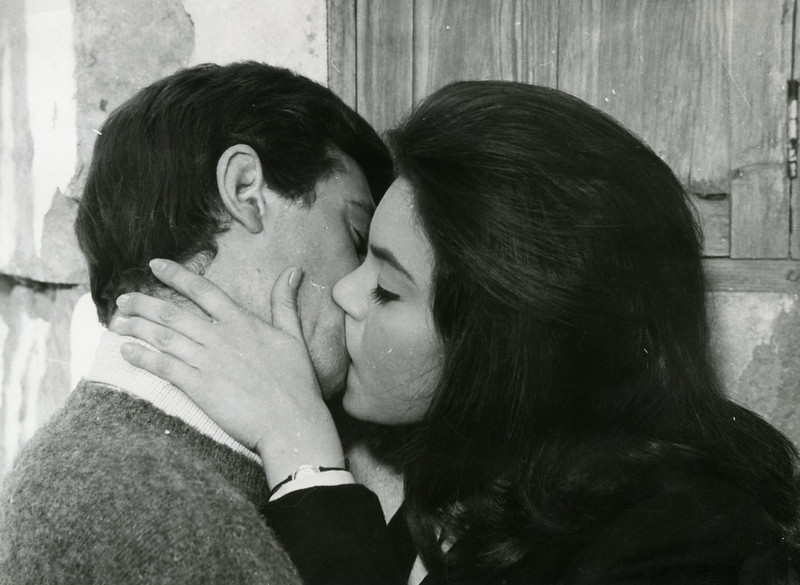➢ The first screening, Nine Letters to Berta, will take place tomorrow, April 20, at 6:00 p.m. at Cinesa El Muelle Screen 5; while Songs for After a War will be screened on Friday 21, at 8:15 p.m., at Cinesa El Muelle Screen 4
➢ Javier Tolentino presents his latest book which, under the title Basilio Martín Patino, approaches the work of the filmmaker from Salamanca who passed away in 2017
➢ The film critic and filmmaker will introduce the features, which have just been restored, to the audience

Las Palmas de Gran Canaria, Wednesday, April 19, 2023.- Basilio Martín Patino is one of Spanish cinema’s essential authors whose legacy will be present at the 22nd Las Palmas de Gran Canaria International Film Festival through two special screenings that recover some of his works. The first one, Nine Letters to Berta (Spain, 1966, 92 min.), will be screened tomorrow, April 20, at 6:00 p.m. at Cinesa El Muelle Screen 5; while the second one, Songs for After a War (Spain, 1971, 99 min.), will be shown on Friday, April 21, at 8:15 p.m. at Cinesa El Muelle Screen 4.
Both films have recently been restored and are coming to the Festival accompanied by the presentation of a book the film critic Javier Tolentino has dedicated to their director, who passed away in 2017. Under the title Basilio Martín Patino, the book published by Cátedra “makes an incursion” in the work of the Salamanca-native filmmaker, which was strongly marked by a free and restless style that constantly searched for new paths and, on numerous occasions, ran up against censorship. Tolentino recalled it at this morning’s press conference, while also claiming that the protagonist of his latest work was “the one that knew how to confront the dictatorship and Franco.”
As Tolentino himself had already stated in the catalog of the Film Festival, “in post-war Spain, in the Spain of greyness and dictatorship, there was a cinema that did not bow to the exaltations of the homeland and the lying Catholic devotion of the regime.” Such independent authors, the journalist recalled, included Martín Patino or Víctor Erice, director of the one-hundred-year-old film The Spirit of the Beehive, around which the present edition of the Festival revolves.

After several works, mostly short films, the late filmmaker enjoyed success in 1966 with Nine Letters to Berta. A work that led him to win that same year the Silver Shell for Best First Work at the San Sebastian International Film Festival, as well as the 1967 Best Screenplay Award from the Spanish Cinema Writers Circle.
The feature was considered the most French New Wave film in Spanish cinema up to that moment for its way of showing “the difficulty of knowledge, art and culture resisting barbarism” from a fiction with “unprecedented and innovative film resources.” The feature tells the story of Lorenzo, a student who has spent his vacation in England and who writes to Berta, a young exile he met during that summer. Through his letters, he unravels his feelings of despair for his future, trapped by a society he does not understand and by a commitment he would like to escape from.
Emilio Gutiérrez Caba, Mary Carrillo and Elsa Baeza are some of the actors who played the characters in the film, which returns to the big screen tomorrow as part of the Festival. Javier Tolentino will be in charge of introducing this masterpiece. The former host of the show ‘El séptimo vicio’ on Radio 3 will also present Songs for After a War, a work he has defined as Martín Patino’s “most beautiful film,” on Friday, April 21.

Released in 1971, this documentary is considered one of his most successful works besides the aforementioned feature film. It revisits the Spanish post-war period through images mainly from NO-DO that are intermingled with popular songs of the time. Imperio Argentina, Estrellita Castro, Miguel de Molina, Lola Flores, Celia Gámez or Juanita Reina are some of the familiar faces appearing in this work, banned until Franco’s death.
But neither censorship nor awards managed to change Martín Patino’s way of making independent films, full of humor and libertarian ideals that were even featured in his last work, Libre te quiero (Spain, 2012, 60 min.), in which he captured what happened during the 15-M movement. His legacy leaves an eternal imprint on film history, despite the fact that he was always “a free and clandestine author,” in Tolentino’s words.
With the upcoming special screenings, the Las Palmas de Gran Canaria International Film Festival pays a well-deserved tribute to one of the seventh art’s undisputed figures who, incidentally, had already appeared at the 2015 Festival thanks to the documentary Basilio Martín Patino. La décima carta, by filmmaker Virginia García del Pino.
The Las Palmas de Gran Canaria International Film Festival, organized by the Culture area of the Gran-Canarian capital’s City Council through Promoción de la Ciudad de Las Palmas de Gran Canaria, has received public assistance by the ICAA [Institute of Cinematography and Audiovisual Arts] and the program for the internationalization of Spanish culture, PICE Visitantes, of Acción Cultural Española (AC/E).
Among the Festival’s collaborators we may find Cinesa El Muelle, El Muelle Shopping Center, Hotel Cristina by Tigotan, the Elder Museum of Science and Technology or Casa África, places which also function as venues or hold activities of the film event; as well as other institutions and companies such as Sagulpa, Hospitales San Roque, Audiovisuales Canarias, Music Library & SFX or the International Bach Festival. Likewise, its market, MECAS, has been possible thanks to the sponsorship of the Gran Canaria Film Commission-Sociedad de Promoción Económica de Gran Canaria and the support of Canary Islands Film and Proexca.
The University of Las Palmas de Gran Canaria, the Mid Atlantic University, the the CIFP Felo Monzón Grau-Bassas, the Canary Islands Film Institute, the Audiovisual Cluster of the Canary Islands, Digital 104, CIMA [Association of Women Filmmakers and Audiovisual Media], the Asociación Microclima Cineastas de Canarias [Association of Filmmakers of the Canary Islands ‘Microclima’] and Tusity are also collaborators of the Festival.
Share this Post

